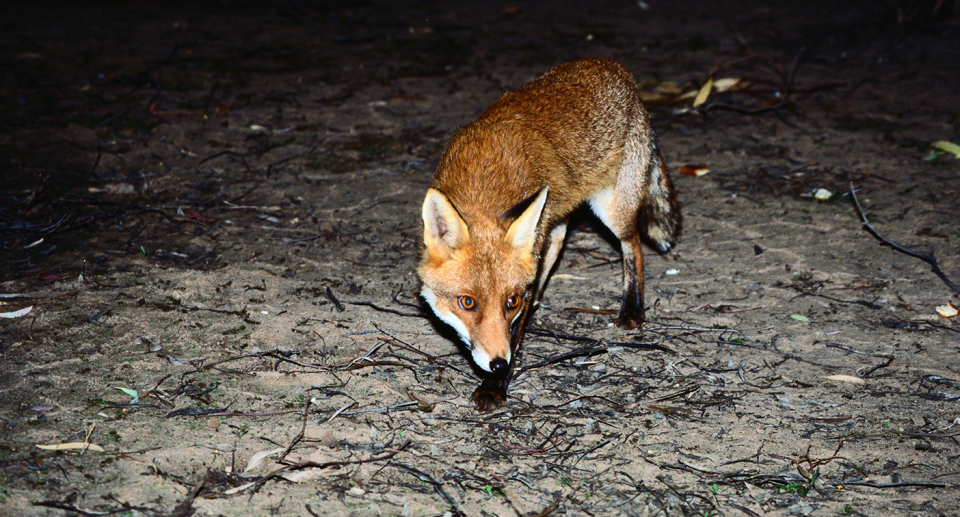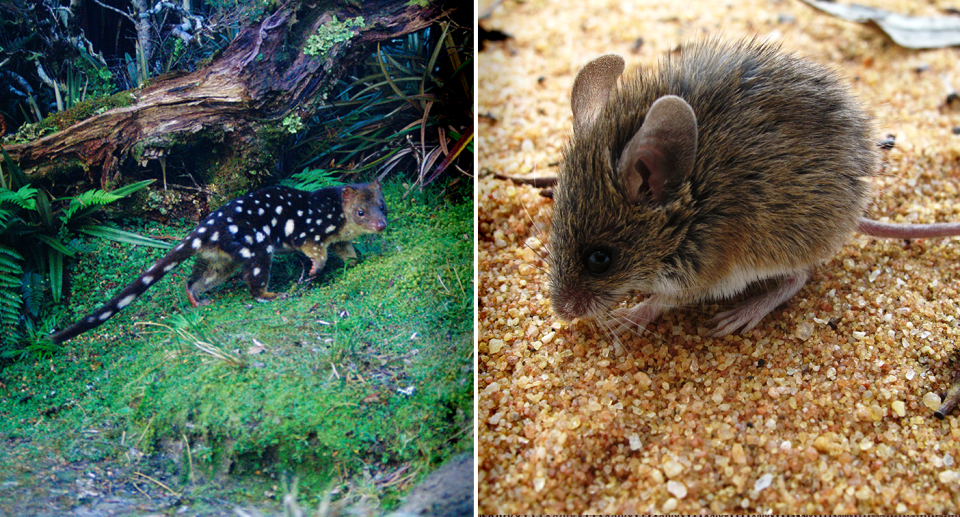'Act of extinction': Concern for wildlife after contentious plan approved
This is the final in a four-part series, reporting on the community impact of the controversial Narrabri gas project.
Wildlife will face an invasion of feral predators if construction of a coal seam gas project inside a NSW forest goes ahead, conservationists fear.
The Pilliga in Narrabri, 452km northwest of Sydney, is home to koalas, along with nationally recognised endangered animals including the fungus loving Pilliga mouse which is endemic to the area.
State and federal government approval has been given for up to 989 hectares of bush to be cleared by energy giant Santos who is currently assessing whether to move forward with a plan to drill 850 gas wells in and around the woodland.
Building inside the forest will be immense, with Santos expected to create 1300 jobs during construction as new cables and pipelines are buried, roads are cut through the forest, and machinery to extract the coal seam gas is trucked in.

This “checkerboard” of construction will create the perfect conditions for introduced species to wander into the park, according to ecologist David Paull.
Speaking with Yahoo News Australia at his home on the edge of the Pilliga, Mr Paull said that foxes in particular are likely to make use of the new thoroughfares when they are cut into the scrub.
Wildlife left homeless and vulnerable after due to habitat loss will be prime targets he fears, with wallabies, possums and antechinus all recorded as being preyed on by foxes.
“The whole thing is like a new grid work of essentially fox tracks going through the forest,” Mr Paull said.
“Fox hunting improves when they have tracks to run along, they rely a lot on tracks and roads and other natural linear features like that.
“So what you’re doing is increasing the predation pressure overall on the whole fauna. Foxes eat everything.”
Fragmentation of habitat could affect threatened species
While the construction may be inviting to foxes, conservationists warn it will have the opposite effect on native animals.
The Pilliga’s 3,000 square km of semi-arid woodland is a remaining wildlife stronghold, with 15 species nationally listed as threatened under the EPBC Act known to have habitat there.
These include the birds like the regent honeyeater and swift parrot and diverse mammal populations of long-eared bats, spot-tail quolls, and the Pilliga mouse which is endemic to the area.
More than 14 mammal species are already thought to be extinct in the region, which has one of Australia’s highest extinction rates, according to the Nature Conservation Council of NSW.

Jess Abrahams from Australian Conservation Foundation (ACF) is concerned that dicing up habitat will lead to species of animals becoming genetically weak as their populations become isolated.
Understanding of how fragmentation affects diversity can be found by looking to islands, Mr Abrahams explained.

“The smaller an island is, and the further away it is from other islands in the ocean, the less number of species that it can support,” he explained.
“The bigger an island and the closer it is to other islands, the more movement across and thus the greater diversity.
“And then we can take that understanding from Islands and the sea and we can bring it onto land. And we're doing the exact same thing to habitat on land.
“We once had large intact areas of habitat, and we're chopping them up into smaller and smaller pieces with greater distances between them.
“As a result, the ability of wildlife and genetic material to move across these isolated islands is leading to increased pressure on wildlife.”
Here are the earlier stories in this project:
Part 1: Farmers fear 'there will be blood spilt' as coal seam gas battle heats up
Part 2: Gas project will destroy sacred site, Indigenous elders fear
Part 4: Concern for wildlife after contentious plan approved
Extinction fears for the koala
Of particular concern to ecologists is the koala, which have been declining in numbers across the Pilliga and the adjoining Liverpool Plains, during a decade of drought.
Bellingen Nature Company ecologist Mark Graham describes this population as being the most significant inland area for koalas in NSW, and amid warnings the species is on track to be extinct in NSW by 2050, this area protection is paramount.
Mr Graham said he believes Santos’ coal seam gas project will result in “absolute fragmentation” in large parts of the forest, with roads and fences creating barriers for the movement of wildlife.

“The proposal by Santos, approved of by state and federal government, will accelerate the extinction of not just koalas but of many other species that need the Pilliga,” he said.
“You can’t do what is being proposed in terms of clearing for an industrial development in an area of intact habitat and not create ecological impacts, not create local extinctions and problems for nationally significant species and all the amazing species that live in the Pilliga.
“It’s a complete act of extinction. Adding in the climate change impact, it’s just adding pressure, upon pressure, upon pressure.”
Government’s ‘embarrassing’ stance on climate change
Climate change has resulted in extended periods of drought and bushfire in Australia, both of which have added to the pressure wildlife has experienced from land clearing.
Last fire season Australia lost more than a billion animals and 35 million hectares of bushland, making the projection of intact areas of forest increasingly important if wildlife is to survive.
Greenpeace Australia Pacific CEO David Ritter argues that the government approving what he describes as a “filthy fossil fuel” project sends a worrying message to the world about our commitment to lowering emissions.
'Friends not talking': Controversial decision dividing Aussie town
'Path to no return': Landmark decision distresses passionate campaigners
Staggering bushfire report reveals government's 'horrifying' effort to save wildlife
Mr Ritter sees President Elect Joe Biden stepping into the White House will be a “game changer” for global momentum on tackling climate change, and that with China, Japan and South Korea setting emissions reductions targets this year, Australia is looking “dismally isolated”.

“It is hard to think of a more embarrassing thing that the Australian government could do,” he told Yahoo News Australia.
“Just as the world is gearing up, is developing real momentum for climate action, (Australia is) opening up a new frontier of highly destructive gas drilling.”
Government satisfied biodiversity will be safeguarded
The government’s support of the coal seam gas project it likely to see forests and farmlands opened up to more drilling across the region, with charity Lock the Gate calling it a “Trojan horse”.
Mr Ritter argues that Australia should be heeding the call of farmers and the region’s Indigenous people, the Gomeroi, many of whom investing in renewable energy rather than embracing fossil fuels.
“The message that it sends is that the Australian Government doesn't care about the climate emergency, “ he said.
“It doesn't care about our wildlife, doesn't care about our farmers, or the future of the agricultural sector, doesn't care about traditional owners and doesn't care about community,” Mr Ritter said.
“And that’s quite a lot of messages to send.”
The project has found support from both the federal and state government, despite widespread community opposition to the plan.
In approving the project last week, federal environment minister Sussan Ley added that the region’s biodiversity will be protected by a number of conditions which include clearing limits, impact mitigation and rehabilitation.
“I am satisfied that the conditions, and the staged nature of work in the area, will safeguard the biodiversity of the Pilliga Forest,” Minister Ley said last week.
“My approval has also been informed by advice from the Commonwealth Independent Expert Scientific Committee on Coal Seam Gas and Large Coal Mining Development (IESC) to ensure the ongoing protection of precious water resources.”
Santos declined to be interviewed for this series, and did not respond to specific questions put to them about the project’s potential impact on wildlife by deadline.
Do you have a story tip? Email: newsroomau@yahoonews.com.
You can also follow us on Facebook, Instagram and Twitter and download the Yahoo News app from the App Store or Google Play.



